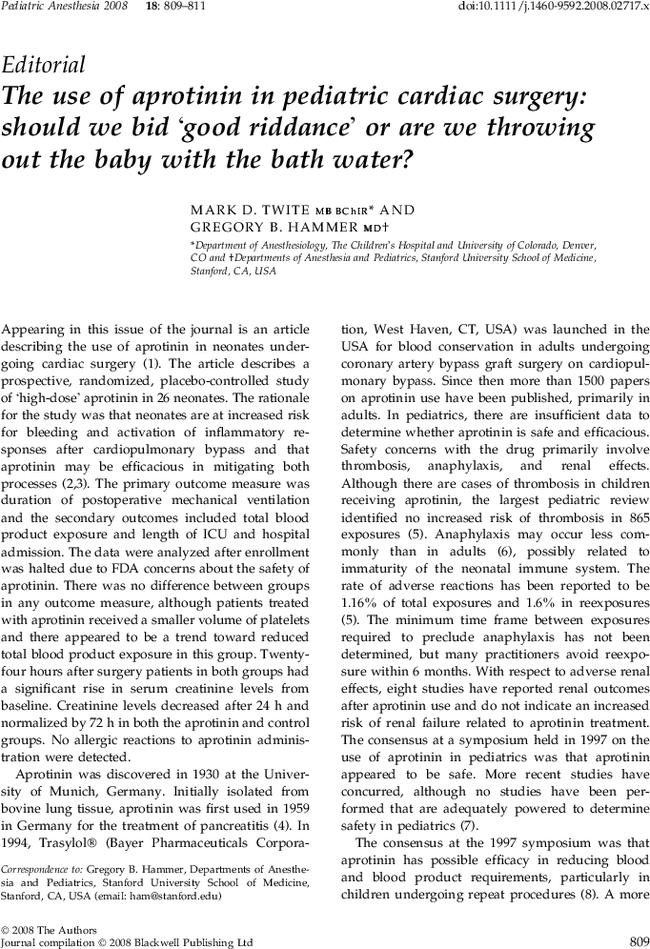The use of aprotinin in pediatric cardiac surgery: should we bid ‘good riddance’ or are we throwing out the baby with the bath water?
MARK D. TWITE MB BChir,
GREGORY B. HAMMER MD,
MARK D. TWITE MB BChir
Department of Anesthesiology, The Children’s Hospital and University of Colorado, Denver, CO
Search for more papers by this authorGREGORY B. HAMMER MD
Departments of Anesthesia and Pediatrics, Stanford University School of Medicine, Stanford, CA, USA
Search for more papers by this authorMARK D. TWITE MB BChir,
GREGORY B. HAMMER MD,
MARK D. TWITE MB BChir
Department of Anesthesiology, The Children’s Hospital and University of Colorado, Denver, CO
Search for more papers by this authorGREGORY B. HAMMER MD
Departments of Anesthesia and Pediatrics, Stanford University School of Medicine, Stanford, CA, USA
Search for more papers by this authorGregory B. Hammer, Departments of Anesthesia and Pediatrics, Stanford University School of Medicine, Stanford, CA, USA (email: [email protected])

References
- 1 Williams GD, Ramamoorthy C, Pentcheva K et al. A randomized, controlled trial of aprotinin in neonates undergoing open-heart surgery. Pediatr Anesth 2008; 18: 812–819.
- 2 Mossinger H, Dietrich W. Activation of hemostasis during cardiopulmonary bypass and pediatric aprotinin dosage. Ann Thorac Surg 1998; 65: S45–S51.
- 3 Buerke M, Pruefer D, Sankat D et al. Effects of aprotinin on gene expression and protein synthesis after ischemia and reperfusion in rats. Circulation 2007; 116: I-121–I-126.
- 4 Levy JH, Sypniewski E. Aprotinin: a pharmacologic overview. Orthopedics 2004; 27: s653–s658.
- 5 Jaquiss RD, Ghanayem NS, Zacharisen MC et al. Safety of aprotinin use and re-use in pediatric cardiothoracic surgery. Circulation 2002; 106: 190–194.
- 6 Dietrich W. Incidence of hypersensitivity reactions. Ann Thorac Surg 1998; 65: S60–S64.
- 7 Backer CL, Kelle AM, Stewart RD et al. Aprotinin is safe in pediatric patients undergoing cardiac surgery. J Thorac Cardiovasc Surg 2007; 134: 1421–1426.
- 8 Coniff RF. The Bayer 022 compassionate use study. Ann Thorac Surg 1998; 65: S31–S34.
- 9 Arnold DM, Fergusson DA, Chan A et al. Avoiding transfusions in children undergoing cardiac surgery: a meta-analysis of randomized trials of aprotinin. Anesth Analg 2006; 102: 731–737.
- 10 Tweddel J, Berger S, Frommelt CP et al. Aprotinin improves outcome of single-ventricle palliation. Ann Thorac Surg 1996; 62: 1329–1336.
- 11 Wipperman CF, Schmid FX, Eberle B. Reduced inotropic support after aprotinin therapy during pediatric cardiac operations. Ann Thorac Surg 1999; 67: 173–176.
- 12 Royston D. High dose aprotinin: a review of the first five years’ experience. J Cardiothorac Vasc Anesth 1992; 6: 76–100.
- 13 Mangano DT, Tudor IC, Dietzel C et al. The risk associated with aprotinin in cardiac surgery. N Engl J Med 2006; 354: 353–365.
- 14 Mangano DT, Miao Y, Vuylsteke A et al. Mortality associated with aprotinin during 5 years following coronary artery bypass graft surgery. JAMA 2007; 297: 471–479.
- 15 Karkouti K, Beattie WS, Dattilo K et al. A propensity score case-control comparison of aprotinin and tranexamic acid in high-transfusion-risk cardiac surgery. Transfusion 2006; 46: 327–338.
- 16 Fergusson DA, Hebert PC, Mazer CD et al. A comparison of aprotinin and lysine analogues in high-risk cardiac surgery. N Engl J Med 2008; 358: 2319–2331.
- 17 Furnary AP, Wu YX, Hiratzka LF et al. Aprotinin does not increase the risk of renal failure in cardiac surgery patients. Circulation 2007; 116: I-127–I-133.
- 18 Van der Linden PJ, Hardy JF, Daper A et al. Cardiac surgery with cardiopulmonary bypass: does aprotinin affect outcome? Br J Anaesth 2007; 99: 646–652.
- 19 Brown JR, Birkmeyer NJO, O’Connor GT. Meta-analysis comparing the effectiveness and adverse outcomes of antifibrinolytic agents in cardiac surgery. Circulation 2007; 115: 2801–2813.




